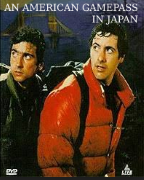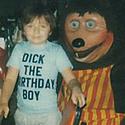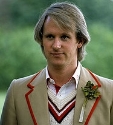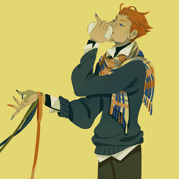|
Schwarzwald posted:To an extent, yes. The Jedi are presented as the foremost authorities of the force, and the blood test pointing toward Anakin being a strong force user is proven correct in future films. Qui-Gon is the most complicated character in the whole series for me, which is pretty remarkable given that he only appears in one film (though I think II and III extrapolate a bit on the nature of the Jedi in a way that reflects back on his characterization). I know that Cnut the Great feels pretty strongly that Qui-Gon was more or less virtuous throughout, but I've recently come to think of him as having more in common with someone like Dooku than Obi-wan. The way he embodies skepticism of Jedi orthodoxy but faith in the religion is pretty interesting, and doesn't seem to be illustrated in any other character besides Luke.
|
|
|
|

|
| # ? May 28, 2024 16:19 |
|
Jewmanji posted:Qui-Gon is the most complicated character in the whole series for me, which is pretty remarkable given that he only appears in one film (though I think II and III extrapolate a bit on the nature of the Jedi in a way that reflects back on his characterization). I know that Cnut the Great feels pretty strongly that Qui-Gon was more or less virtuous throughout, but I've recently come to think of him as having more in common with someone like Dooku than Obi-wan. The way he embodies skepticism of Jedi orthodoxy but faith in the religion is pretty interesting, and doesn't seem to be illustrated in any other character besides Luke. Dooku trained Qui-gon, so it makes sense that they share similar views. Qui-gon's clashes with the Jedi orthodoxy also give some doubt to his intentions in testing Anakin's blood. Is it because he, himself, has doubts? Or is it that he doesn't believe the Jedi council will entertain him without material evidence?
|
|
|
|
Dooku says as much that he wishes Qui-Gon were still around and how he had hoped Obi-Wan would be more like him.
|
|
|
|
Brainiac Five posted:The whole point of power levels in DragonBall Z is that they're bullshit. A distraction from what's really important. I agree. Midi-chlorirans are exactly what the Jedi say they are, and the metaphor they represent is essential to the Jedi philosophy, but the exact number someone has isn't the point. Lucas all but says it himself: George Lucas posted:Now in this particular case, the gods happen to be a life-form that allows a cell to divide. So it's a metaphor: that which brings life. I don't want to get too controversial about this – some people believe it happened in other ways, over seven days, but if you listen to biology, there's another theory, which begins with an e. If you study microbiology, you will come to the realization that this alien life-form, which has a completely different DNA, helped create life on earth and within the galaxy. But every cell has one of these life-forms in it. It's a simplified version of relationships – that symbiotic being goes through everything. That's why Han Solo joins the Rebellion, that's why Luke saves his father. In Star Wars land, all these relationships are necessary to bring forth a greater good – and evil. It doesn't matter that Han Solo doesn't have enough midi-chlorians in his cells to be able to lift a rock with his mind. The important part is that he has midi-chlorians in his cells at all, that he's a living being who depends on other living beings to exist, and that he realize that and do good. All the midi-chlorians are part of a greater whole, and there's actually no division between them at all, really: George Lucas posted:“Midi-chlorians are like a single entity: meaning each one doesn’t think individually and have a life to itself; they think as a unit because there’s so many of them and they’re everywhere. They’re in every single cell. And sometimes there’s more than one in a cell. Sometimes there’s a whole bunch in a cell. But there has to be at least one in a cell, otherwise the cell can’t reproduce. All cells. Plant cells. Every life form has a midi-chlorian living inside of them.” http://www.rollingstone.com/movies/news/george-lucas-and-the-cult-of-darth-vader-20050602 During the latter part of his career Lucas seems to have gotten really interested in the idea of symbiotic hiveminds. The idea shows up in Kingdom of the Crystal Skull as well. There's a lot of crazy stuff going on in the movie regarding that, though a lot of people seem to have missed it. The blue crystal skull aliens are a benign knowledge-seeking hivemind; the Soviet villain Spalko seeks to use the crystal skulls to impose an oppressive Communist hivemind on the world; a hivemind of killer red ants shows up at one point and ironically devours and subsumes several members of its "Red" Communist counterpart, while at the same time being repulsed by the blue crystal skull hivemind carried by the heroes....but that's getting off topic. Not particularly deep compared to what Star Wars has to offer, but that's because Indiana Jones is a different kind of series. What can I say, though, I like crazy stuff like that. e: Schwarzwald posted:To an extent, yes. The Jedi are presented as the foremost authorities of the force, and the blood test pointing toward Anakin being a strong force user is proven correct in future films. Qui-Gon is presented as a character who takes a radically balanced approach to everything he does. He sensed and suspected that Anakin was something special, but being Force-sensitive doesn't make you omniscient. Jedi are only human (or alien) at the end of the day; they're not all-powerful. So he exercises healthy skepticism when appropriate, and when it's time to take that leap of faith, he takes that leap of faith. Blind faith isn't a virtue. Even the Council agreed that there was a distinct possibility that Anakin was the Chosen One based on his midi-chlorian count, his impressive Force ability demonstrated through testing, and Qui-Gon's unconfirmed assertion that the Sith may have returned--but they still initially refused to train him, because they didn't have faith in him as a person. Qui-Gon stood by him at that point because he did have that faith. At that point he was operating purely based on the fatherly connection he'd made with Anakin--a rather un-Jedi like thing to do, and of course it led to disastrous consequences, but also good ones. Again, as in everything, Qui-Gon is the epitome of balance. Schwarzwald posted:Dooku trained Qui-gon, so it makes sense that they share similar views. I think it's a little bit of both. What he's entertaining in his mind is nothing short of extraordinary beyond almost anything that can be conceived. I think the fact that Qui-Gon even thought it prudent to take a sample for that purpose is supposed to show how much more willing he is than an average Jedi to put stock in such crazy ideas. I don't get the impression that any regular Jedi would have even bothered to consider that Anakin might be the Chosen One of an ancient and outdated prophecy, destined to destroy a Sith menace that no longer even exists to be destroyed--and certainly no ordinary Jedi would have gone to such great lengths to free him. Cnut the Great fucked around with this message at 04:24 on Dec 4, 2016 |
|
|
|
I would read any longform pieces you might write about Star Wars. Please consider it.
|
|
|
|
If we are being perfectly honest here, Dragon Ball Z is the pinnacle of art and nothing will surpass it.
|
|
|
|
I said come in! posted:If we are being perfectly honest here, Dragon Ball Z is the pinnacle of art and nothing will surpass it. It's the perfect blend of Journey to the West, Star Wars, and DC comics, so you're not wrong.
|
|
|
|
The best part of Star Wars will always be that a Jefferson Starship song is canon.
|
|
|
|
Star Wars isn't real and neither is Midiclorians.
|
|
|
|
Neo Rasa posted:The best part of Star Wars will always be
|
|
|
|
Nah it's the light sabers.
|
|
|
|
Lightsabers are pretty good.
|
|
|
|
Booked seats for Rogue One. I hope it's a good film.
|
|
|
|
Steve2911 posted:Booked seats for Rogue One. I hope it's a good film. I just hope it's better than TFA
|
|
|
|
Davros1 posted:I just hope it's better than TFA Same, though TFA was pretty good itself.
|
|
|
|
Davros1 posted:I just hope it's better than TFA TFA was great but it would be nice if it was even better yes.
|
|
|
|
TFA was a fantastic movie. I think Rogue One will be amazing.
|
|
|
|
It was pretty mediocre, which is the worst kind of Star Wars. Rogue One seems to be more like the better Star Wars movies, in that it looks to be both brilliant and stupid.
|
|
|
|
BravestOfTheLamps posted:It was pretty mediocre, which is the worst kind of Star Wars. No the worst kind of Star Wars is the really bad ones.
|
|
|
|
PostNouveau posted:Nah it's the light sabers. Bongo Bill posted:Lightsabers are pretty good. A pretty simple concept but there are few fictional weapons that look as cool in action
|
|
|
|
UmOk posted:Ray Bradbury has said that the only science fiction story he wrote was Fahrenheit. The rest he considered fantasy. Genre is in the eye of the beer holder. Bongo Bill posted:The most common distinction between the genres of science fiction and fantasy is made by aligning all fiction along a spectrum. At the near end of this spectrum is literary fiction: things that could be true, but aren't. Barudak posted:Sci fi is just a sub genre of fantasy. Like they used to be considered one thing (they'd be published in the same magazines and sold in the same section of the book store) and it wasn't strange to have space aliens and robots in your sword and sorcery pulp novel. Now we've been ingrained to treat them differently but fundamentally they do the same things. I've been reading through the thread and I'm genuinely disturbed by what I'm reading. Star Wars is science fiction. The science-fictional questions it poses are very basic, but apparently those are still beyond some of you. Like, "Are slaves still slaves if they're conditioned to be slaves?" Yes, for gently caress's sake. And that's less shocking than the lack of ethics on display. People making no-poo poo Lost Cause of the Confederacy arguments about why the Jedi shouldn't fight slavery. Some of you apparently don't read science ficiton, and didn't absorb your 3rd grade history lessons about the Civil War. Therefore, you were unprepared for the level of political nuance in Star Wars Episode II: Attack of the Clones. Which is not a lot. This is a lot more concerning than an idiot troll making the thread about him for three pages.
|
|
|
|
Yeah if there's not more context to Bradbury saying that he was probably drunk or so old he forgot all his stories. As vague and dumb as marketing genres are, it would still be really tough to argue Kaleidoscope or Rocket Man or There Will Come Soft Rains as not sci fi, just to stick to well known stories.
|
|
|
|
Halloween Jack posted:Ray Bradbury is the greatest American author, but even here he's wrong. For example, just off the top of my head: most of his Martian stories were fantastical explorations with little regard for scientific questions. But the simple question "what if marginalized people could travel beyond the reach of Earthly authorities and set up their own societies?" is an extremely sci-fi question. Likewise the title story of "I Sing the Body Electric!" In order for a film or book, or whatever, to 'be' a genre, it must be read as that genre. In order for Star Wars to be 'Fantasy', you must first answer basic questions like whose fantasy we are talking about (diegetically and/or otherwise), and the psychology behind it. Tezzor is not doing this. He is instead fantasizing about Star Wars. The films are not being read at all.
|
|
|
|
SuperMechagodzilla posted:In order for a film or book, or whatever, to 'be' a genre, it must be read as that genre. In order for Star Wars to be 'Fantasy', you must first answer basic questions like whose fantasy we are talking about (diegetically and/or otherwise), and the psychology behind it. And the whole bit about "x is y genre" being shorthand, conscious or not, for "x is conducive to being read as y genre" etc etc. So there will come soft rains is certainly conducive to being read as a fantasy of human irrelevance/impermanence or whatever, but also as a sci fi rendering of the lives of the servile in a world without masters, in contrast to say, The Highway where exploited third world workers watch refugees fleeing nuked US cities and are just like, lol whatta buncha maroons. Star Wars has all the same stuff going on with "machines building machines" and production for imaginary or vanished consumers and slaves being dismissive of the concerns of their masters and approaches it with a similar mix of fairy tale and sci fi parable, it's just schlocky pulp instead of elegiac pulp. Edit: I really don't think phi is tezzor. He doesn't write all that similarly, he just has an equally short temper and lack of confidence. DeimosRising fucked around with this message at 22:32 on Dec 4, 2016 |
|
|
|
Rogue One will likely be fine, it looks like it's at least going to do something a bit different unlike TFA Tezzor isn't a person, it's a title like dread pirate roberts
|
|
|
|
gary whitta hasnt written a decent thing so im not holding onto hope
|
|
|
|
Halloween Jack posted:Ray Bradbury is the greatest American author, but even here he's wrong. For example, just off the top of my head: most of his Martian stories were fantastical explorations with little regard for scientific questions. But the simple question "what if marginalized people could travel beyond the reach of Earthly authorities and set up their own societies?" is an extremely sci-fi question. Likewise the title story of "I Sing the Body Electric!" I wasn't agreeing with him I just thought it was interesting. He said it in an interview that was attached to the audio-book version of Fahrenheit 451. I couldn't find the exact one but here is a similar quote from Wikipedia: "First of all, I don't write science fiction. I've only done one science fiction book and that's Fahrenheit 451, based on reality. It was named so to represent the temperature at which paper ignites. Science fiction is a depiction of the real. Fantasy is a depiction of the unreal. So Martian Chronicles is not science fiction, it's fantasy. It couldn't happen, you see? That's the reason it's going to be around a long time – because it's a Greek myth, and myths have staying power." Genre is just a way to categorize things and it is totally up to the individual to define. A "fake idea" or whatever some derp will call it.
|
|
|
|
SuperMechagodzilla posted:In order for a film or book, or whatever, to 'be' a genre, it must be read as that genre. In order for Star Wars to be 'Fantasy', you must first answer basic questions like whose fantasy we are talking about (diegetically and/or otherwise), and the psychology behind it. Uh, does it need to be someone's fantasy to count as fantasy? One of the big selling points of the modern 'fantasy' genre as it's popularly conceived is the idea of "an alternate world," or an "alternate history." Things like Lord of the Rings, A Song of Ice and Fire, Isaac Asimov's Foundation, Legend of the Galactic Heroes and yes Star Wars are presented as being a sort of imaginary historical record; so like, you have the story of The Iron Dream where it's clearly somebody's fevered imaginings that reflect an ideology but then you have these works presented as dry, objective history or folkloric cycle. It's like the literary agent hypothesis of these is that there is no author, just a record or archive or Encyclopedia Galactica. Dune is kinda close but is explicitly the work of one historian who writes an introduction and everything, although she makes frequent references to an Encyclopedia as well.
|
|
|
|
Bradbury was notoriously poor in his early career, so we clearly shouldn't pay any attention to what he thinks about his books.
|
|
|
|
UmOk posted:Genre is just a way to categorize things and it is totally up to the individual to define. A "fake idea" or whatever some derp will call it. A heuristic.
|
|
|
|
WENTZ WAGON NUI posted:Uh, does it need to be someone's fantasy to count as fantasy? One of the big selling points of the modern 'fantasy' genre as it's popularly conceived is the idea of "an alternate world," or an "alternate history." Things like Lord of the Rings, A Song of Ice and Fire, Isaac Asimov's Foundation, Legend of the Galactic Heroes and yes Star Wars are presented as being a sort of imaginary historical record; so like, you have the story of The Iron Dream where it's clearly somebody's fevered imaginings that reflect an ideology but then you have these works presented as dry, objective history or folkloric cycle. It's like the literary agent hypothesis of these is that there is no author, just a record or archive or Encyclopedia Galactica. Dune is kinda close but is explicitly the work of one historian who writes an introduction and everything, although she makes frequent references to an Encyclopedia as well. Even then, it can be the fantasy of a group, of a culture.... In the example of the Lord Of The Rings films, we see all these enormous castles without any peasantry. No farms, etc. So even though we can read it as an alt-history/alt-history story, you nonetheless have this fantasy of unlimited food without farmers, trade, industrialization, etc. That's the distinction, for me.
|
|
|
|
Name one inhabited castle in Lord of the Rings. Like with a lord and everything. Old men living alone in Orthanc don't count. Here I'll go through it for you: there aren't any. Rivendell is an unfortified manor, Orthanc is a drafty old tower that houses one guy, Moria is a ruined city, Edoras is a town with a palisade, Helm's Deep is an uninhabited fortress, Osgiliath is a ruined city, Minas Tirith is a fortified city. Only Sauron maintains castles, and they are inhabited by monsters. Lord of the Rings has its historical roots a few hundred years before the advent of feudalism in northern Europe. Arglebargle III fucked around with this message at 00:41 on Dec 5, 2016 |
|
|
|
Arglebargle III posted:Name one inhabited castle in Lord of the Rings. There's Edoras, whose surrounding farmers (but not the farms themselves) are also depicted, and Minas Tirith, the farmland surrounding which (the fields of Pelennor) was abandoned so it could be used as a battlefield. Also Minas Morgul and Barad-Dur, but the farms in Mordor don't appear in the film adaptation. Orthanc has one inhabitant, sometimes two, and of course there are the breeding pits eventually established underneath. Rivendell might qualify as a castle. Lothlorien, too, though the question of agriculture there is not as simple as it seems. There's no castle in the Shire, but Pippin's family's estate would be the closest equivalent; this is not depicted, however. In The Hobbit films, there's the unnamed castle of Thranduil in Mirkwood, which at least has some commoners working there. When Erebor becomes inhabited again, there are already peasants nearby from Dale, but their characteristic activity is fishing, not farming. Bongo Bill fucked around with this message at 00:44 on Dec 5, 2016 |
|
|
|
Meduseld is a Frisian king's hall straight out of Beowulf. There were no castles in that society and Edoras is just a fortified town. Tolkien was consciously reviving Anglo-Saxon literature, which is almost entirely pre-feudal. They're moving in that direction by the 10th century but until the boy king period England was still organized into Shires dating back to Alfred the Great's day. The Normans imported counts and castles in the 11th century. There's a reason you don't see feudal manors and serfs in Lord of the Rings and it's not because the filmmakers forgot them. Trying to re-classify as castles Rivendell or Lothlorien which are both entirely unfortified settlements is an example of the overreach you have to commit to apply ideas of feudalism to Lord of the Rings. Thranduil's "castle" is a cave whose sole fortification is a bridge. Erebor is also a city, not a castle. The society depicted in Lord of the Rings does have class divides and those divides are not treated in the way a work based in modern sensibilities would, but it's not a feudal society. Arglebargle III fucked around with this message at 00:52 on Dec 5, 2016 |
|
|
|
Well, I just thought they'd be relevant to this digression, even if only as counterexamples. Are we talking the books, which are extremely meticulous about this sort of thing, or the films, which play things a bit fast and loose because their condensation makes them rely on shorthand which are filled in by modern connotations that can differ substantially from Tolkien?
|
|
|
|
There are hardworking rural folk close at hand when we're introduced to the Shire, but in keeping with what you're saying, what strikes me as weird (from the expectation that it's a feudal world) is that the nearby kingdoms of Men just regard them as quaint likeable folk, and leave them alone except to trade with them. Despite all we hear about Men being greedy and power-hungry. Now, for contrast (though we don't have a filmic adaptation), in Jack Vance's series like The Dying Earth and Planet of Adventure, it's common for the hero to wander into a completely self-contained town, with a unique culture that's radically different from the last town the hero wandered into. (In fact, it's remarkably similar to most JRPGs.) This lack of cultural continuity is totally unrealistic, but also deliberate--Vance wants to explore the idea of, for example, a town where everyone follows a ridiculously strict penal code without question, because the past was more glorious than the present. Halloween Jack fucked around with this message at 01:01 on Dec 5, 2016 |
|
|
|
Halloween Jack posted:There are hardworking rural folk close at hand when we're introduced to the Shire, but in keeping with what you're saying, what strikes me as weird (from the expectation that it's a feudal world) is that the nearby kingdoms of Men just regard them as quaint likeable folk, and leave them alone except to trade with them. Despite all we hear about Men being greedy and power-hungry. we have no evidence to lend to the idea that the Hobbits/Shirelings are serfs though. Just simple country folk. Idyllic simple farmers in Tolkien's luddite fantasy land and uh Sauron only keeps and maintains castles because he's evil and apparently wanting to keep and maintain power (and also defend locations) is evil
|
|
|
|
Getting back the original point, LMAO at Lord of the Rings not having farms, trade, or industrialization. The first hour of the series takes place in farm country. There are named farmer characters, although our heroes are country gentry like Tolkien. We see orcs burning farming settlements in Rohan. It's not mentioned but the wide flat plain around Minas Tirith is wide and flat because it's cultivated, although the farmers have already moved within the walls by the time our heroes arrive. Industrialization is not only not absent it is in fact a major theme of the films and clearly associated with evil. Tolkien and the film-makers consciously evoke the early 20th century horror of the industrial revolution consuming nature. Smokestacks replacing quaint villages is straight-up presented as an image of horror to Sam in Galadriel's magic mirror, in the same film where the climax features animated trees reclaim an industrial hellscape for the natural world. There's no real discussion of trade in the Lord of the Rings movies but the Hobbit makes trade relationships between the elves, humans, and dwarves explicit.
|
|
|
|
poo poo LOTR is a giant anti-industrial work (and thus is also counter-revolutionary) this mostly comes from Tolkien idealizing his youth as simple country person and seeing urbanization and industrialization as some evil corrupting force, plus you know, WW1 but ask yourself, if the Free Peoples of Middle Earth had bolt action rifles, machineguns,artillery, and aircraft things would've gone a lot more smoothly. in the end its all anti-collectivist bullshit. whether its the Rebellion's rugged individualism or free people's hatred of standardization and industrialization Phi230 fucked around with this message at 01:06 on Dec 5, 2016 |
|
|
|

|
| # ? May 28, 2024 16:19 |
|
Halloween Jack posted:There are hardworking rural folk close at hand when we're introduced to the Shire, but in keeping with what you're saying, what strikes me as weird (from the expectation that it's a feudal world) is that the nearby kingdoms of Men just regard them as quaint likeable folk, and leave them alone except to trade with them. Despite all we hear about Men being greedy and power-hungry. The books, as always, offer an explanation. The Shire is theoretically part of the kingdom of Arnor. Arnor was almost completely depopulated not too long prior; what little power or authority men have there is not supported by enough manpower to project it farther than the next village over. There's the Shire, which is at least capable of managing its internal affairs; there's a scattering of crappy villages; and there's vast uninhabited wilderness, where the Rangers (the heirs to the throne of Arnor) have their hands full keeping an eye out for trouble and trying to steer it discreetly away into other people's territories. Any man there who wants power is better off leaving to try to get it from somewhere that there's more than sleepy provincial backwater to lord over.
|
|
|































